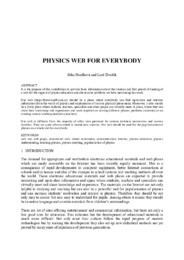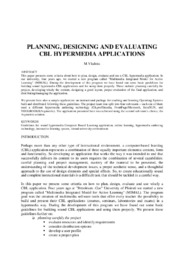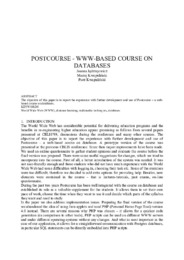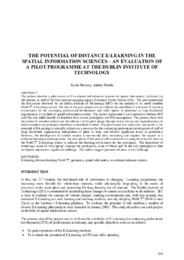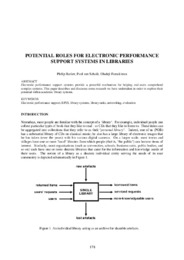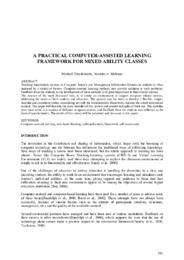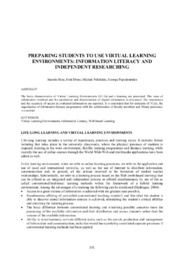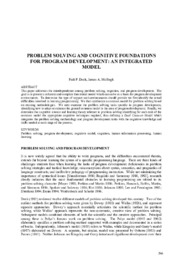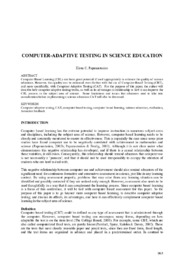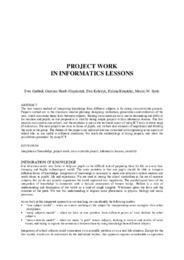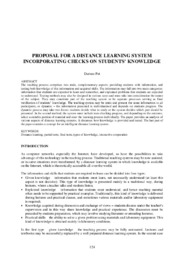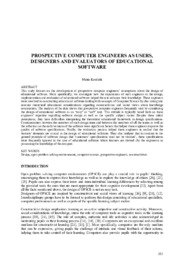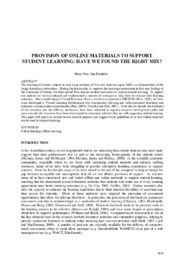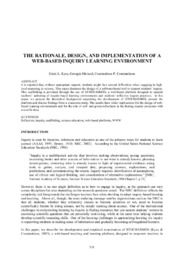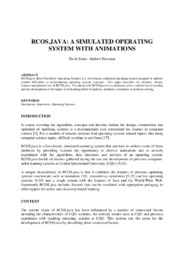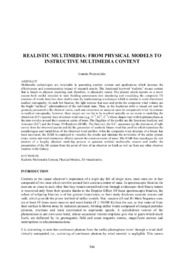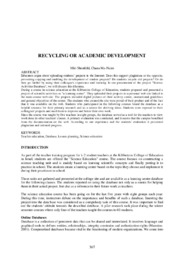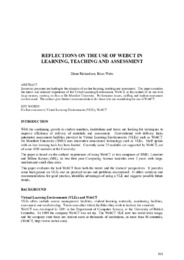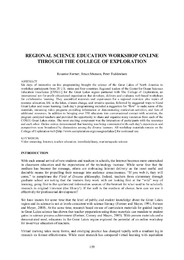Browsing Computer Based Learning in Science (CBLIS) by Title
Now showing items 221-240 of 337
-
Physics web for everybody
(Pedagogical Faculty of University of Ostrava, 2001)It is the purpose of this contribution to provide basic information about the creation and first period of running of a web for the support of physics education and about some problems we have met during this work. Our web ... -
Planning, designing and evaluating CBL hypermedia applications
(Pedagogical Faculty of University of Ostrava, 2001)This paper presents some criteria about how to plan, design, evaluate and use a CBL hypermedia application. In our university, four years ago, we started a new program called "Multimedia Integrated Model for Active Learning" ... -
Postcourse - www-based course on Databases
(Pedagogical Faculty of University of Ostrava, 2001)The objective of this paper is to report the experience with further development and use of Postcourse a webbased course on databases. -
The potential of distance e-learning in the Spatial information sciences – an evaluation of a pilot programme at the dublin institute of Technology
(Department of Educational Sciences, University of Cyprus, 2003)The authors describe a pilot course in ‘Co-ordinate and reference systems for spatial information’, delivered via the Internet, to staff of the Irish national mapping agency, Ordnance Survey Ireland (OSi). The pilot ... -
Potential roles for electronic performance support systems in libraries
(University of Zilina, 2005)Electronic performance support systems provide a powerful mechanism for helping end-users comprehend complex systems. This paper describes and discusses some research we have undertaken in order to explore their potential ... -
A practical computer-assisted learning framework for mixed ability classes
(Department of Educational Sciences, University of Cyprus, 2003)Teaching introductory courses in Computer Science and Management Information Systems to students is often hindered by a variety of factors. Computer-assisted learning methods may provide solutions to such problems. Feedback ... -
Preparing students to use virtual learning Environments: information literacy and Independent researching
(University of Cyprus, 2007)The basic characteristics of Virtual Learning Environments (VLEs) and e-learning are presented. The issue of information overload and the production and dissemination of digital information is discussed. The importance and ... -
Problem based learning over the internet
(University of Zilina, 2005)The main goal of this paper is to discuss a new form of learning that would be appropriate for application in Learning Management Systems utilized in distance education courses over the Internet. It is supposed to be good ... -
Problem solving and cognitive foundations for program development: an integrated model
(Department of Educational Sciences, University of Cyprus, 2003)This paper addresses the interdependence among problem solving, cognition, and program development. The goal is to present a coherent and complete theoretical model which can serve as a basis for program development ... -
Productive face-to-face interview
(Department of Educational Sciences, University of Cyprus, 2003)Computer Based Learning (CBL) can have great potential if used appropriately to enhance the quality of science education. However, this quality can be enhanced even further with the use of Computer Based Testing (CBT), and ... -
Project work in informatics lessons
(Pedagogical Faculty of University of Ostrava, 2001)The best known method of integrating knowledge from different subjects is by doing cross-curricula projects. Projects carried out in the classroom involve planning, designing, realisation, presentation and evaluation of ... -
Proposal for a Distance Learning System Incorporating Checks on Students’ Knowledge
(University of Zilina, 2005)The teaching process comprises two main, complementary aspects: providing students with information, and testing both knowledge of this information and acquired skills. The information may fall into two main categories: ... -
Prospective computer engineers as users, designers and evaluators of educational software
(Department of Educational Sciences, University of Cyprus, 2003)This study focuses on the development of prospective computer engineers’ conceptions about the design of educational software. More specifically, we investigate how the experiences of such engineers in the design, ... -
Provision of online materials to support student learning: have we found the right mix?
(Department of Educational Sciences, University of Cyprus, 2003)The teaching of science subjects to very large numbers of first year students (up to 1800) is a characteristic of the larger Australian universities. During the last decade, to improve the learning environment in first ... -
The rationale, design, and implementation of a web-based inquiry learning environment
(University of Cyprus, 2007)It is reported that, without appropriate support, students might face several difficulties when engaging in highlevel reasoning in science. This paper discusses the design of a software-based tool to support students’ ... -
Rcos.java: a simulated operating system with animations
(Pedagogical Faculty of University of Ostrava, 2001)RCOS.java (Ron Chernich's Operating System) is a Java-based, simulated operating system designed to address student difficulties in understanding operating systems concepts. This paper describes the rationale, design, features ... -
Realistic multimedia: from physical models to Instructive multimedia content
(University of Cyprus, 2007)Multimedia technologies are invaluable in generating realistic content and applications which increase the effectiveness and communication impact of research results. The functional keyword “realistic” means content that ... -
Recycling or academic development
(University of Zilina, 2005)Educators argue about uploading students’ projects to the Internet. Does this support plagiarism or the opposite, preventing copying and enabling the development of student projects? Do students recycle old projects? Or ... -
Reflections on the use of webct in Learning, teaching and assessment
(Department of Educational Sciences, University of Cyprus, 2003)Economic pressures are leading to the adoption of on-line learning, teaching and assessment. This paper considers the tutors' and students' experience of the Virtual Learning Environment, WebCT, in the context of its use ... -
Regional science education workshop online through the college of exploration
(University of Cyprus, 2007)Six days of interactive on-line programming brought the science of the Great Lakes of North America to workshop participants from 20 U.S. states and four countries. Regional leaders of the Center for Ocean Sciences Education ...
